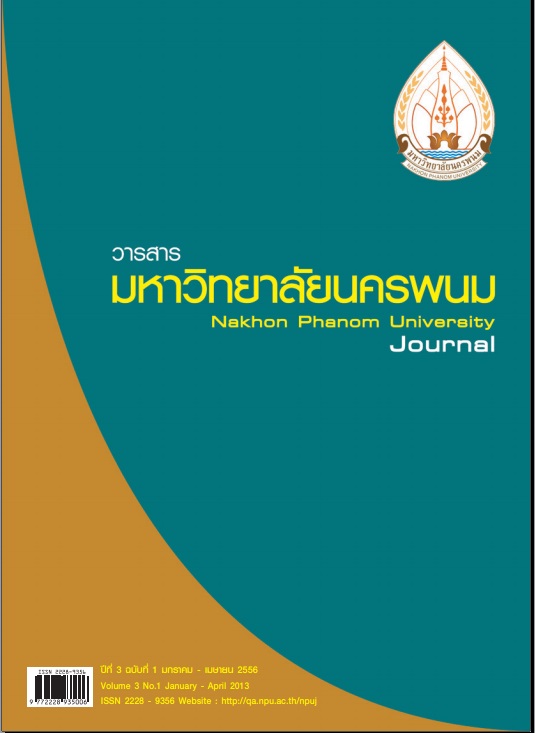ผลการจัดการเรียนรู้ด้วยกลุ่มแบบ TGT การจัดการเรียนรู้แบบวัฏจักรการเรียนรู้ 7 ขั้นต่อความสามารถในการคิดวิเคราะห์ ทักษะกระบวนการทางวิทยาศาสตร์และผลสัมฤทธิ์ทางการเรียน เรื่อง หน่วยของชีวิตและชีวิตพืช กลุ่มการเรียนรู้วิทยาศาสตร์ของนักเรียนชั้นมัธยมศึกษาปีที่1
Main Article Content
Abstract
การวิจัยครั้งนี้มีวัตถุประสงค์เพื่อเปรียบเทียบ 1) ความสามารถในการคิดวิเคราะห์ 2) ทักษะกระบวนการทางวิทยาศาสตร์ 3) ผลสัมฤทธิ์ทางการเรียน ระหว่างนักเรียนที่เรียนด้วยการจัดการเรียนรู้ด้วยกลุ่มแบบ TGT กับกลุ่มที่เรียนด้วยการจัดการเรียนรู้แบบ วัฏจักรการเรียนรู้ 7 ขั้น.กลุ่มตัวอย่างที่ใช้ในการวิจัยเป็นนักเรียนชั้นมัธยมศึกษาปีที่ 1 โรงเรียนอุเทนพัฒนาได้แก่ ชั้นมัธยมศึกษาปีที่ 1/1 จำนวน 45 คน ซึ่งเรียนแบบการจัดการเรียนรู้ด้วยกลุ่มแบบ TGT และนักเรียนชั้นมัธยมศึกษาปีที่ 1/2 จำนวน 45 คน ที่เรียนแบบ วัฏจักรการเรียนรู้ 7 ขั้นเครื่องมือที่ใช้ในการวิจัยได้แก่ 1) แบบวัดความสามารถในการคิดวิเคราะห์จำนวน 30 ข้อมีค่าความยากรายข้อ ตั้งแต่ 0.21-0.75 ค่าอำนาจจำแนกรายข้อตั้งแต่ 0.21-0.72 และค่าความเชื่อมั่น (KR-20) เท่ากับ .84 2) แบบวัดทักษะกระบวนการ ทางวิทยาศาสตร์มีค่าความยากรายข้อตั้งแต่ 0.42-0.76 ค่าอำนาจจำแนกรายข้อตั้งแต่ 0.25-0.87 และค่าความเชื่อมั่น (KR-20) เท่ากับ .86 และ 3) แบบวัดผลสัมฤทธิ์ทางการเรียนมีค่าความยากรายข้อตั้งแต่ 0.22-0.77 ค่าอำนาจจำแนกรายข้อตั้งแต่ .21-.82 และค่าความเชื่อมั่น (KR-20) เท่ากับ .76 สถิติที่ใช้ในการวิเคราะห์ข้อมูลได้แก่ ร้อยละค่าเฉลี่ยส่วนเบี่ยงเบนมาตรฐานและวิเคราะห์ ความแปรปรวนร่วมผลการวิจัยพบว่า 1) นักเรียนที่เรียนด้วยการจัดการเรียนรู้แบบวัฏจักรการเรียนรู้ 7 ขั้นมีความสามารถในการคิดวิเคราะห์สูงกว่านักเรียนที่เรียนด้วยการจัดการเรียนรู้ด้วยกลุ่มแบบ TGT อย่างมีนัยสำคัญทางสถิติที่ระดับ .01 2) นักเรียนที่เรียนด้วยการจัดการเรียนรู้ด้วยกลุ่มแบบ TGT มีทักษะกระบวนการทางวิทยาศาสตร์สูงกว่านักเรียนที่เรียนด้วยการจัดการเรียนรู้แบบวัฏจักรการเรียนรู้ 7 ขั้นอย่างมีนัยสำคัญทางสถิติที่ระดับ .01 3) นักเรียนที่เรียนด้วยการจัดการเรียนรู้ด้วยกลุ่มแบบ TGT มีผลสัมฤทธิ์ทางการเรียนสูงกว่านักเรียนที่เรียนด้วยการจัดการเรียนรู้แบบวัฏจักรการเรียนรู้ 7 ขั้นอย่างมีนัยสำคัญทางสถิติที่ระดับ .01
The purposes of the research were to compare 1) Analytical thinking abilities 2) Science process skills, 3) Learning achievement between the students who learned through the TGT cooperative learning management and those who learned through the 7Ecyclelearning management. The samples used in this study were 90 students of Matthayomsuksa 1 at Uthenpattana School. They were classified into 2 groups: the 45 students from the classroom no. 1/1 learned through the TGT cooperative learningmanagement and other 45 students from the classroom no. 1/2 learnedthrough the 7E cycle learning management. The instruments used in the study were 1) A 30-item test of analytical thinking ability which its difficulty of each item isin a range of 0.21-0.75, discriminating values were 0.21-0.72 and reliability (KR-20) is 0.84 ; 2) A test of science process skills which its difficulty of each item was in a range of 0.42-0.76, discriminating values were 0.25-0.87 and reliability (KR-20) was 0.86 ; and 3) An achievement test which its difficulty of each item was in a range of 0.22-0.77, discriminating values were 0.21-0.82 and reliability (KR-20) was 0.76. Statistics used for analyzing the collected data were percentage, mean, standard deviation andanalysis of covariance. The results of the study were as follows: 1) The students who learned through the 7E cycle learning management had analytical thinking higher than those who learned through the TGT cooperative learning management at the significance level of .01. 2) The students who learned through the TGT cooperative learning management had science process s+kills higher than those who learned through the 7E cycle learning management at the significance level of .01. 3) Thestudents who learned through the TGT cooperative learning management had learning achievement higher than those who learned through the 7E cycle learning management at the significancelevel of .01.


